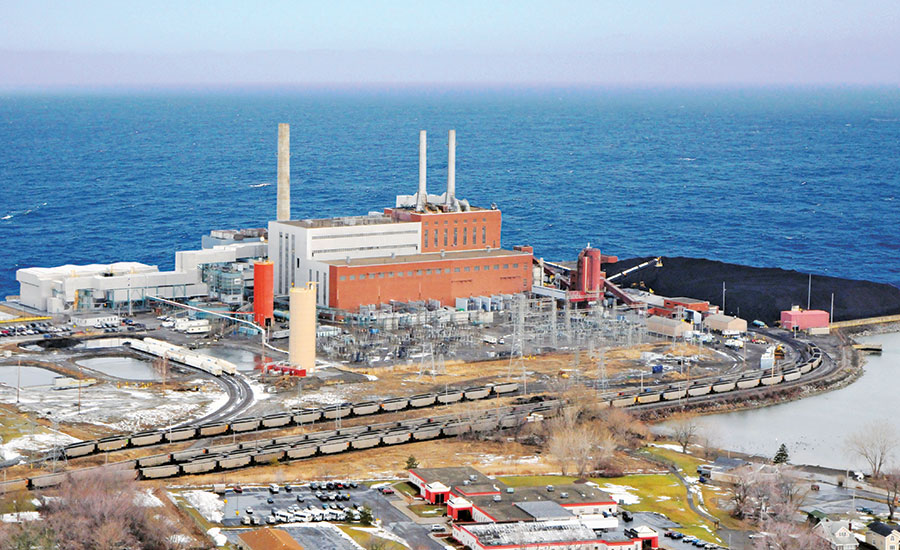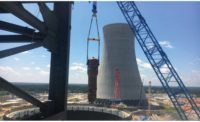Possible Reprieve for New York Power-Plant Conversion Project

On-Off Switch NRG’s coal-fired power plant on Lake Erie was set to convert to gas, but a lawsuit by Entergy blocked the move. The suit has been withdrawn, and NRG is pondering resumption of the switch. Courtesy NRG
NRG Energy is dusting off plans to convert a dormant coal-fired plant on the shore of Lake Erie in Dunkirk, N.Y., to burn natural gas.
The three-year-old plan was delayed by a lawsuit, which recently was withdrawn, but that does not necessarily mean the project has a clear shot at implementation.
The conversion plan dates back to December 2013, when NRG and National Grid, the local electric distribution company, reached an agreement to keep open the Dunkirk plant.
NRG in 2012 said it would mothball the 510-MW coal plant because it was uneconomic in New York’s competitive wholesale market, in which low-priced natural gas usually sets the clearing price.
NRG negotiated a reliability support services agreement with National Grid to keep two coal units operating, one until the end of May 2013 and the second to the end of 2015. Under a separate agreement, NRG agreed to repower three of the four units to burn gas instead of coal with National Grid purchasing the electrical output under a contract that calls for yearly payments of $20.4 million over 10 years and includes a one-time $15 million payment from the Empire State Development Corp.
The agreement raised the ire of some market participants who saw the off-take contract as a side deal that would skew prices in the state’s wholesale power market.
One of those generators, Entergy—the New Orleans power company that, through its competitive generation unit, owns the FitzPatrick and Indian Point nuclear plants in New York—in February 2015 filed a lawsuit in federal district court to block NRG’s conversion plan, arguing that it represented state intervention in a federally sanctioned wholesale power market. But on Nov. 21, Entergy withdrew its lawsuit “to focus on other business priorities.”
Entergy itself is the beneficiary of an out-of-market arrangement struck by New York to keep open its FitzPatrick nuclear plant. A couple months after the deal was announced, Entergy agreed to sell FitzPatrick to Exelon, which owns two nuclear plants in New York.
Entergy’s withdrawal of its suit cleared a path for NRG to restart the conversion project. “The Entergy suit created a lot of uncertainty,” says David Gaier, NRG spokesman.
“We are ready and intend to resume” the conversion project, which calls for the “addition of gas capability” to the plant, but will not do so until the other stakeholders confirm their previous commitments, says Gaier.
The stakeholders are the PSC, National Grid, gas supplier National Fuel Gas Co. and ESDC.
The project does not call for building new gas turbines at the site but for switching the boilers to gas firing from coal. In theory, the boilers would be able to switch back to coal firing.
The original project called for National Fuel Gas to build a 9.7-mile, 16-in.-dia steel transmission pipeline to connect the Dunkirk plant to the existing Tennessee Gas Pipeline, in Arkwright, Tenn. The project also would involve changes to the piping and nozzles in the boiler.
Gaier declined to give more detail on the scope of the work that could be involved or how much it would cost. He also said it is too early in the process to discuss the choice of a contractor for the project.
Once necessary permits are secured, construction of the repowering project is expected to take about 24 months.
Meanwhile, the PSC in May opened a hearing into whether NRG should still receive payments under the off-take agreement, approved in 2014, in part because NRG has let the plant lie fallow, instead of proceeding with the conversion.
Prior to the Entergy’s decision to withdraw its lawsuit, NRG filed comments in the proceeding, detailing the steps it has taken toward the conversion and noting the uncertainty created by the pending lawsuit.
PSC spokesman Jon Sorensen says the hearing is ongoing, but there is no deadline or action scheduled.


